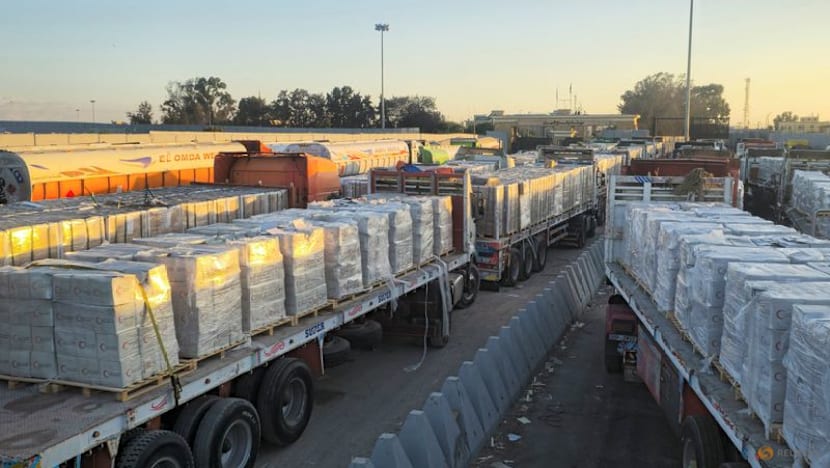Politics
Netanyahu Declares Rafah Crossing Closed Amid Hostage Negotiations

Israeli Prime Minister Benjamin Netanyahu announced on October 18, 2024, that the Rafah border crossing between Gaza and Egypt will remain closed until further notice. He linked the crossing’s reopening to the return of the remaining bodies of Israeli hostages held by Hamas. Netanyahu’s statement followed conflicting information regarding the border’s status, as the Palestinian embassy in Cairo had previously indicated that Rafah would reopen on Monday for entry into Gaza.
Hamas has indicated it will hand over two additional bodies at 22:00 local time (19:00 GMT), raising the total number of returned remains to 12 out of 28 Israeli hostages. This transfer is part of a broader, US-brokered ceasefire and hostage deal that aims to ease tensions in the region.
Fragile Ceasefire and Hostage Negotiations
The ongoing negotiation over the return of bodies has underscored the tenuous nature of the ceasefire. The agreement, part of a 20-point peace initiative proposed by US President Donald Trump, allowed Hamas to release all 20 surviving Israeli hostages it had held for two years. In exchange, nearly 2,000 Palestinian prisoners held in Israel were released.
Israeli officials have accused Hamas of being slow in returning the bodies, suggesting that such delays are used as leverage in the negotiations. In response, Hamas stated that the extensive destruction in Gaza complicates their efforts to locate the bodies, requiring both time and the proper equipment.
As part of the exchange, Israel has reportedly returned 15 bodies of Palestinian militants for each Israeli body received. This reciprocal arrangement highlights the complexity of the ongoing negotiations.
Humanitarian Concerns and Aid Shortages
The Rafah crossing has been largely closed since May 2024, preventing thousands of Gazans from leaving the conflict-ridden enclave. The ceasefire deal also called for a significant increase in humanitarian aid. Despite this, the United Nations World Food Programme reports that an average of only 560 metric tonnes of food per day have entered Gaza since the ceasefire began. This amount remains drastically below the population’s needs.
Prior to the ceasefire, Israel had imposed a blockade that cut off supplies for 11 weeks in March. Although aid routes were gradually reopened in July, the current levels of assistance are insufficient to meet the demands of a population grappling with the aftermath of war.
Major challenges continue to loom over Trump’s peace plan, including the disarmament of Hamas, future governance of Gaza, the formation of an international stabilization force, and the path toward a Palestinian state. Netanyahu’s remarks reflect a deep mistrust between the involved parties, complicating the efforts of international mediators to maintain both the ceasefire and the broader peace process.
As the situation develops, the humanitarian crisis in Gaza remains a pressing concern, with many calling for urgent action to address the ongoing needs of those affected by the conflict.
-

 Lifestyle4 months ago
Lifestyle4 months agoHumanism Camp Engages 250 Youths in Summer Fest 2025
-

 Business5 months ago
Business5 months agoKenvue Dismisses CEO Thibaut Mongon as Strategic Review Advances
-

 Sports4 months ago
Sports4 months agoDe Minaur Triumphs at Washington Open After Thrilling Comeback
-

 Sports5 months ago
Sports5 months agoTupou and Daugunu Join First Nations Squad for Lions Clash
-

 Top Stories5 months ago
Top Stories5 months agoColombian Senator Miguel Uribe Shows Signs of Recovery After Attack
-

 World5 months ago
World5 months agoASEAN Gears Up for Historic Joint Meeting of Foreign and Economic Ministers
-

 Health4 months ago
Health4 months agoNew Study Challenges Assumptions About Aging and Inflammation
-

 Business5 months ago
Business5 months agoOil Prices Surge Following New EU Sanctions on Russia
-

 Entertainment4 months ago
Entertainment4 months agoDetaşe-Sabah Violin Ensemble Captivates at Gabala Music Festival
-

 Entertainment4 months ago
Entertainment4 months agoBaku Metro Extends Hours for Justin Timberlake Concert
-

 Top Stories5 months ago
Top Stories5 months agoRethinking Singapore’s F&B Regulations Amid Business Closures
-

 Business5 months ago
Business5 months agoU.S. House Approves Stablecoin Bill, Sends to Trump for Signature









